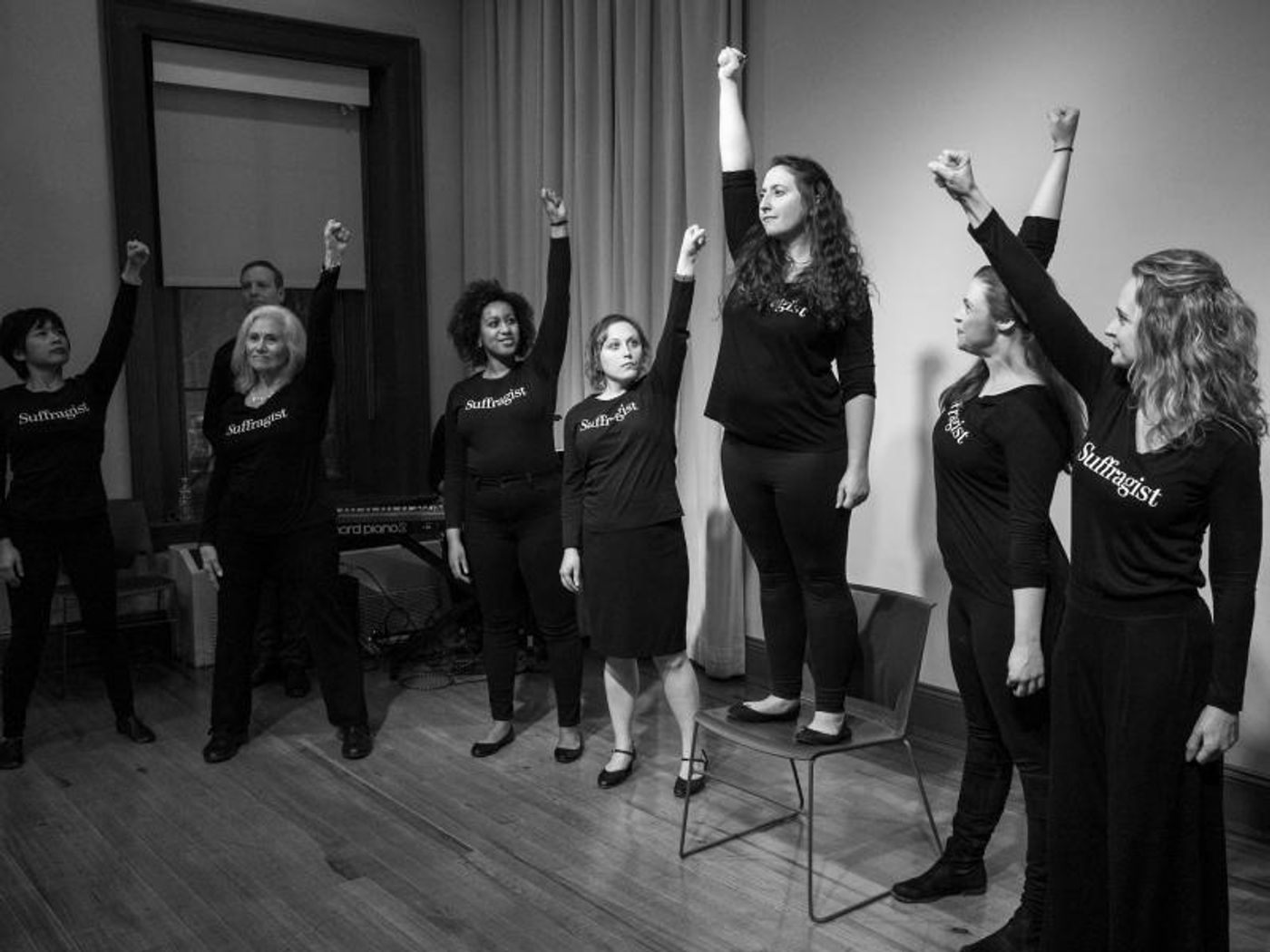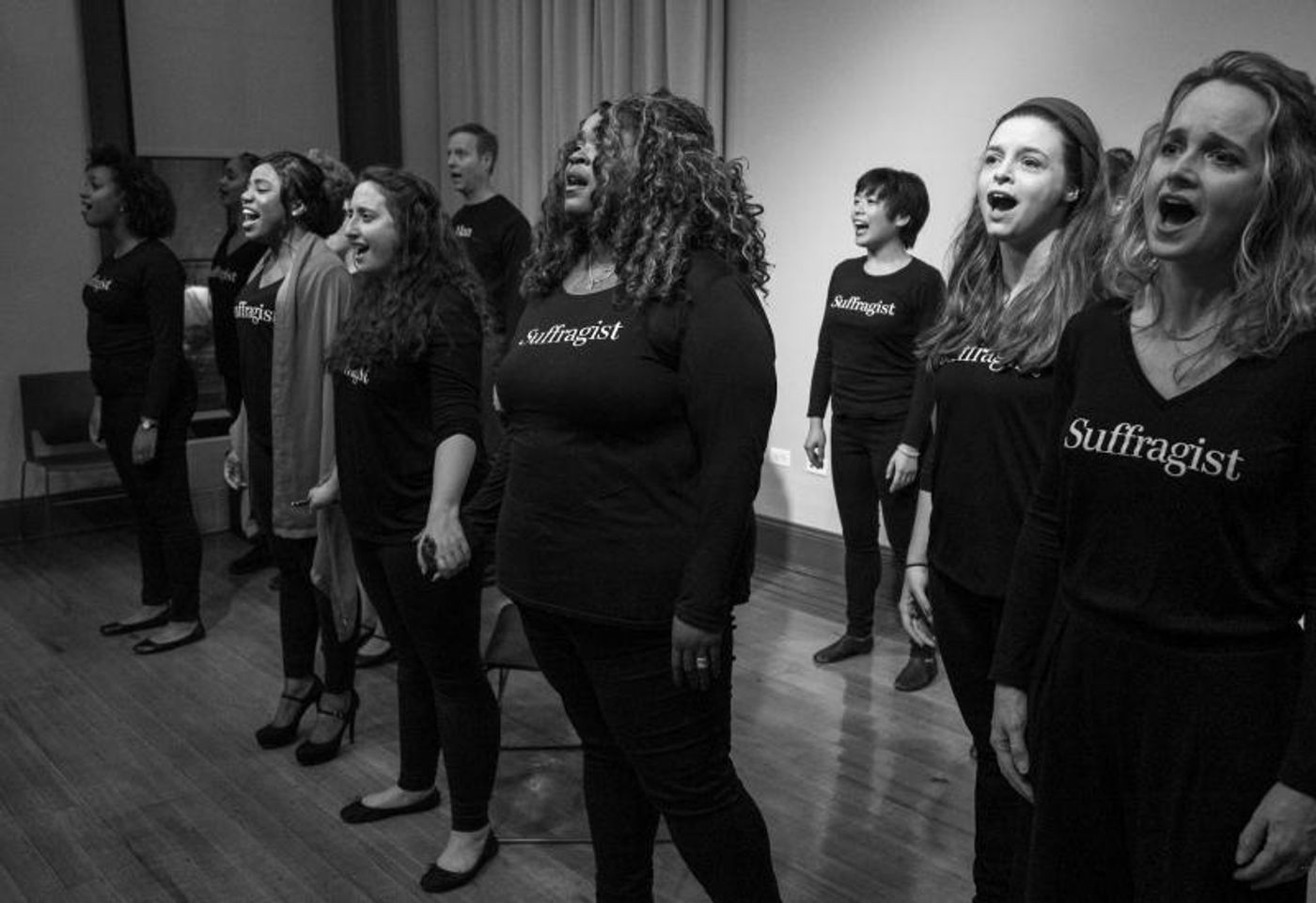Review: 19: THE MUSICAL at The Hill Center

We are living in a time when women are making themselves known. In politics, in media, in literature, in the workplace, women are pushing to the forefront and demanding they be seen and heard. The last few years - coming so close to the first female president, the subsequent Women's March and other protests, the rise of the #metoo movement, and more women running for and winning political offices in US history - all feel like the buildup of A Moment in time, one that will hopefully be looked back on as a major turning point for women and for the country. 19: The Musical is a new show that hopes to capture and build on that moment by reminding the world about another great Moment in history: the passage of the 19th Amendment, which granted women the Constitutionally-protected right to vote.
Of course, there should be an asterisk next to "women" in that last sentence - white women were able to vote following the 1920 passage of the amendment, but it would be nearly another half-century before the Civil Rights Movement succeeded in establishing policies to ensure suffrage be uninhibited for women (and men) of color, and today, nearly a full century since the amendment passed, voter suppression tactics aimed at people of color are still shamelessly thriving.
But one of the joys of 19: The Musical is that it chooses to lean into this concern rather than portray the women's suffrage movement as a pretty success story. The show opens with a celebration of the passage of the 19th Amendment in 1920, with women celebrating and sipping champagne, but interrupts its own revels to recognize the cost of victory, and those who were left behind. The show then travels back to the school days of one of the Suffrage Movement's leaders, Alice Paul. Paul, whose Quaker family was deeply invested in civil rights, wonders about the direction her life should take and reflects on the suffragist meetings she occasionally attended with her mother. Ultimately, she travels to England, where she witnesses a speech about women's suffrage by British leader Christabel Pankhurst that inspires her to join the fight. She connects with fellow American Lucy Burns, who becomes a close friend and who later joins her as a leader in the push for voting rights back in the United States. Their stateside movement, though, runs into a number of issues related to racial tensions - when planning the 1913 Woman Suffrage Procession, some groups refused to march in mixed racial company, while women of color, including the famed Ida B Wells, rightfully demanded they not be excluded. The march did eventually go forward, but was met with rioters and police officers unwilling to protect the women or let them pass.
From here, 19 chronicles the suffragists' attempts to persuade President Wilson, their Silent Sentinels protest outside the White House, action at the state level, continued racial divides, and the imprisonment and torture that women faced. Finally, the 19th Amendment is ratified, with Harry Burn, a Republican lawmaker in Tennessee, casting the deciding vote after his mother persuaded him to change his position. The show ends with a heartfelt reflection on the victory, the sacrifices of those who came before, and the work that remained.
.jpg?format=auto&width=1400)
Currently, 19: The Musical is not a staged production, but a touring concert performance featuring songs from the finished musical, which the creative team hopes to premiere in time for the 2020 Centennial celebration of the Amendment's passage. But the concert performance format has the advantage not only of giving the audience an opportunity to interact with the show (each show ends with a Q&A session with the cast and production team), but also the opportunity to experience the show in a stripped-down and intimate setting. Creators Jennifer Schwed and Doug Bradshaw teamed up with composer Charlie Barnett to produce a musical that is sweet, earnest, smart, and sensitive. The cast - most of whom, it should be noted with admiration, are not professional actors - is immensely talented and clearly passionate about the production. Katie Ganem is magnetic and inspiring as Alice Paul, and Millicent Scarlett's Ida B Wells steals the show with her heartbreaking portrayal of a passionate advocate trying to find her place within the movement. Meredith Eib plays Lucy Burns with such a bright earnestness that Burns' imprisonment and torture hits the audience particularly hard, and Maria Ciarrocchi's Carrie Chapman Catt is delightfully hard-headed and pragmatic. Elizabeth Keith skillfully guides the audience through the concert setting, and Susan B Anthony, the musical's main narrator, is beautifully portrayed by the wonderful Debora Crabbe. Angela Norris and Danielle Marquis enhance the whole performance by adding some unexpected choreography, which delightfully captures the time period and gives audiences a sense of the full staged production, but also skillfully conveys some of the heavier moments with grace.
I personally found a few of the anachronisms (such as the use of "#blessed" in one song) to be a little jarring, but the audience around me seemed to love it, and some of the modern references, such as the use of "reclaiming my time," gave the show a sense of connection to current day while still keeping in the history. I also felt the song about Harry Burn to be bit weaker than the rest, but that may be because the rest were so solid.
In fact, the only sour notes of the evening came not from the show, but from the speakers before and after the performance, who are unaffiliated with the production itself. One of the organizers from the One Women, One Vote Festival kept referring to the show as "1900." The introduction for the evening's performance was given by Bob Bland, one of the leaders of the Women's March; Bland asked the audience to applaud the men in the room for showing up, then promptly left without watching the show. And, despite two previous rounds of asking the audience whether they were attending the Women's March the next day, one of the hosts asked yet again and admonished audience members for opting not to attend.
But the reason I mention these incidents is that the lack of nuance and awareness on the part of these hosts only further highlighted how well 19 handled its portrayals of the controversies within the women's suffrage movement. The show and its cast all display a sensitivity to those who were left out, while still acknowledging the value of the the work done and sacrifices made by the Suffragettes. They go further, though, and also manage to produce a show that balances strong emotions with some humor, a lot of history, and a lot of fun.
It may be a lofty goal to hope that 19: The Musical achieves Hamilton-like heights, but, much like the women it portrays, it's certainly up to the task and should not be underestimated. I, for one, cannot wait for the staged production.

19: The Musical is currently touring the DC-metro area. More information on upcoming performances can be found at https://www.19themusical.com/shows. This review is based on the January 18th performance at The Hill Center.
Read more about 19: The Musical in BroadwayWorld's interview with show creators Jennifer Schwed and Doug Bradshaw.
Photo Credit: John Nelson
Reader Reviews

Videos

